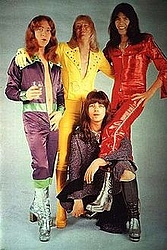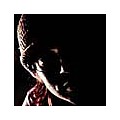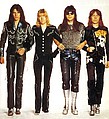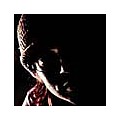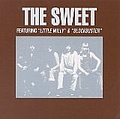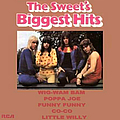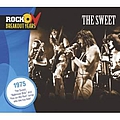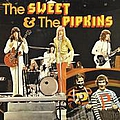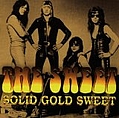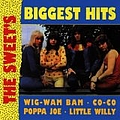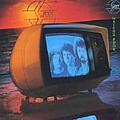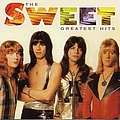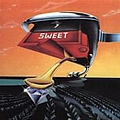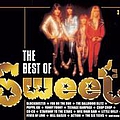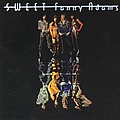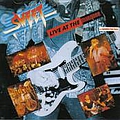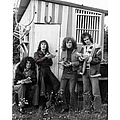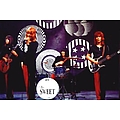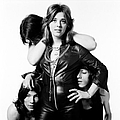The Sweet Biography
Origins Sweet's origins go back to 1965, with UK soul band "Wainwright's Gentlemen", which included drummer Mick Tucker and vocalist Ian Gillan. The group were limited to small UK clubs playing a mixture of R&B and psychedelia. Gillan quit in May 1965 to join Episode Six, and, later, Deep Purple. Gillan's eventual replacement was vocalist Brian Connolly. Tucker and Connolly remained with Wainwright's Gentlemen until early 1968. [edit] Early years In January 1968, Brian Connolly and Mick Tucker left Wainwright's Gentlemen to form another band, calling themselves The Sweetshop. They recruited a bass guitarist/lead vocalist named Steve Priest from a local band called 'The Army', having previously played with another local band 'The Countdowns'. Frank Torpey, a friend of Tucker's, was recruited to play guitar. It did not take long for Sweetshop to develop a following on the pub circuit, and they were signed to the Fontana record label. At the time, another UK band released a single under the same name Sweetshop, so the band shortened the name to The Sweet. Their debut single "Slow Motion" (July 1968) failed to chart. Sweet was released from the recording contract, and Frank Torpey left. Steve Priest in his autobiography says Gordon Fairminer was approached to play for them when Torpey decided to leave but turned the job down as they were only receiving £15.00 per week at the time. [edit] New line-up and new record deal In 1969 guitarist Mick Stewart joined, and Sweet signed a new record contract with EMI's Parlophone label. Three more bubblegum pop singles were released, "Lollipop Man" (September 1969), "All You'll Ever Get From Me" (January 1970), and a cover version of Archies, "Get On The Line" (June, 1970), which all failed to chart. Stewart then quit, and was replaced by ex-Scaffold, Mayfield's Mule, and Elastic Band guitarist Andy Scott. Out of all the members, Scott had the most professional experience. As a member of the Elastic Band, he had played guitar on two singles for Decca "Think Of You Baby" and "Do Unto Others". He also appeared on the band's lone album release, Expansions On Life. With the new line-up now in place, a management deal was secured with a newly formed, and unknown song writing team, consisting of Nicky Chinn and Mike Chapman. Phil Wainman was the executive producer. This management deal also included a worldwide (except U.S.) record contract with RCA Records. Sweet initially attempted to combine various musical influences, including 1960s bubblegum pop groups such as The Archies and The Monkees, with more heavy rock-oriented groups such as The Who. Sweet adopted the rich vocal harmony style of The Hollies, with distorted guitars and a heavy rhythm section. This fusion of pop and hard rock would remain a central trademark of Sweet's music and prefigured the hair metal of a decade later. Another influence on Sweet's music was 1960s drummer Sandy Nelson, who partially influenced Mick Tucker's drumming style. In particular, Sweet tracks such as "Ballroom Blitz" and "The Man With The Golden Arm" contain elements of Sandy Nelson's 1961 U.S. Top 10 hit, "Let There Be Drums". [edit] First album appearance Sweet's first album appearance was on a Music For Pleasure release, but The Sweet had one side only, The Pipkins (after whose sole hit, "Gimme Dat Ding", the LP was titled) had the other. The LP features the A-side and B-sides of the three commercially unsuccessful Parlophone singles before Sweet finally found success with "Funny Funny", which was the band's first single release for RCA. Despite the album cover shot of The Sweet featuring Andy Scott, he was not actually a band member until "Funny Funny" and does not feature on any of these recordings. The band's guitarist then was Mick Stewart and wrote two of the featured B-sides on this compilation. The official release date was December, 1970. In January 1971, Sweet made their UK television debut on a pop show called Lift Off, performing "Funny Funny". [edit] International success In March 1971, "Funny Funny" became their first international hit, climbing to the Top 20 on many of the world's charts. Although the next single, "All You'll Ever Get From Me" (May 1971) failed to chart, "Co-Co" (June 1971) became a hit (UK #2). But the following single, "Alexander Graham Bell" (October, 1971) was only a minor hit (UK #33). Sweet's first official full-size LP album entitled Funny How Sweet Coco Can Be was released towards the end of 1971, and failed to chart. An oddly endearing collection of Chinn/Chapman novelty tunes (including "Chop Chop" and "TomTom Turnaround") and ill-fitting pop covers (such as the Lovin' Spoonful's "Daydream" and The Supremes' "Reflections"), the album on reflection stands fairly well now for devoted Sweet fans, but on release was not a serious contender on the charts, although RCA did press 10,000 copies. As the LP faded into obscurity, Sweet found themselves being labelled by music critics as nothing more than a Top 40 singles band. Furthermore, Chinn and Chapman hindered the band's chance for respectability by bringing in session musicians, a la The Monkees, to play on the records, even though the members of Sweet were competent musically. The relationship between Sweet and Chinn / Chapman was becoming increasingly tense. One major reason was that Sweet were not happy with the 'bubblegum' image that was being cast on them. At the band's insistence and as a conscious contrast, their B-sides got heavier with each release; for example, "Done Me Wrong All Right", the self-penned B-side of "Co-Co" amazed some listeners who had hated the pop sound but loved their rock style and realised there was more to the band than they had thought. This dichotomy of bubblegum A-sides and heavy rock B-sides only served to confuse their teenage fan following. Indeed, The Sweet's live performances consisted of B-sides, album tracks and various medleys of rock and roll classics; rarely were the singles played live. In February 1972, "Poppa Joe" was released and stopped at the gates of the United Kingdom Top 10, at number 11. The next two singles of the year, "Little Willy" and "Wig-Wam Bam" both peaked at #4 on the UK Singles Chart, and "Little Willy" peaked at #3 on the U.S. Billboard Hot 100 after a re-issue in 1973, becoming the group's biggest American hit. Although "Wig-Wam Bam" remained largely true to the style of Sweet's previous recordings, the vocals and guitars had a harder, more rock-oriented sound - largely because it was the first Sweet single on which the real members of Sweet played. It was in many ways, a transition single, paving the way for the change of musical emphasis that came in January 1973 with "Block Buster!" (an imperative to "Block Buster", later falsely often contracted to "Blockbuster", alluding with wailing siren sounds to Blockbuster bombs of World War II), Sweet's first chart-topping single, which quickly reached #1 on the UK chart. "Hell Raiser" was released in May and reached position #2, the success of which was repeated by the subsequent singles, "The Ballroom Blitz" (September, 1973) and "Teenage Rampage" (January, 1974). As the group's popularity grew, Sweet put in a heavy schedule of UK and European TV promotional appearances, including numerous Top Of The Pops and Supersonic slots. Sweet soon picked up a large teenage audience. In one performance of "Block Buster!" on Top of the Pops, Priest aroused complaints after he appeared wearing a Nazi uniform and displaying a swastika armband.[citation needed] The band also capitalised on the glam rock explosion, rivaling Gary Glitter, T. Rex, Queen, Wizzard, and Slade for outrageous stage clothing. [edit] Forming a new image By 1974, Sweet had grown tired of the artistic control Chinn and Chapman exerted over their career, hence the group and Phil Wainman decided to record without the duo. The resulting album, Sweet Fanny Adams, was their first Top 40 entry in the UK Albums Chart. Sweet's technical proficiency was demonstrated for the first time on self-penned hard rock tracks such as "Sweet FA" and "Set Me Free". Sweet also dropped their glam rock image in favour of a more conventional hard rock appearance. In response to UK music critics, Sweet concentrated on proving their musical talents with self-written tracks. The Sweet Fanny Adams album (first for the band as Sweet) also featured compressed high-pitched backing vocal harmonies, which was a trend that continued on all of Sweet's albums. Sweet, with contemporary UK bands T Rex and Queen, were recognised as some of the main exponents of high-pitched harmonies during the 1970s. During sessions for the album Brian Connolly was injured in a fight in Staines High Street. His throat was badly injured and his ability to sing severely limited. Priest and Scott filled in on lead vocals on some tracks ("Into The Night" and "Restless") and Connolly under treatment from a Harley Street specialist managed to complete the album. The band did not publicise the incident and told the press that subsequent cancelled shows were due to Connolly having a throat infection.[citation needed] [edit] Desolation Boulevard In early 1974 Sweet had received public praise from The Who's guitarist, Pete Townshend. Sweet had also frequently cited The Who as being one of their main influences and played a medley of their tracks in their live set for many years. At Townshend's invitation, Sweet were invited to support The Who, who were playing at Charlton Athletic's football ground, The Valley in June 1974. Connolly's badly bruised throat kept them from fulfilling the role. Some critics maintain that Connolly's voice never really recovered after this incident, and he was unable to sing with the strength and purity he had on their album and single releases.[citation needed] A second album was released during 1974 called Desolation Boulevard. One of the tracks off this album was a cover of The Who's "My Generation" (not on the U.S. version of the album). This album, produced by Mike Chapman in place of the now-departed Phil Wainman, was recorded in a mere six days and featured a rawer "live" sound. The first single from the LP, the heavy-melodic "The Six Teens" (July, 1974) was a Top 10 hit in the UK, Germany and the Netherlands. However, the subsequent single release, "Turn It Down" (November, 1974) reached only #41 on the UK chart. "Turn It Down" received minimal airplay on UK radio and was banned by some radio stations because of certain lyrical content - "God-awful sound" and "For God's sakes, turn it down" - which were deemed "unsuitable for family listening." [edit] The Sweet Singles Album and Strung Up In 1975, RCA released a compilation album entitled The Sweet Singles Album (Australia and New Zealand only). This LP featured singles recordings, including the hits "The Ballroom Blitz", "Teenage Rampage", "Block Buster" and "Hell Raiser". The album coincided with their Australian and New Zealand tour and was a big seller. A double album, Strung Up was released in November (except USA), which contained one (and first for the band) live disc, recorded in the UK in December 1973, the other disc being a compilation of previously released A and B side singles (plus a new song by Chinn and Chapman - "I Wanna Be Committed"). Also at the end of the year Andy Scott released his first solo single titled "Lady Starlight". This was accompanied by a solo video clip of Scott playing the song (A subsequent alternative version was later added to the Japanese and U.S. versions of the 1976 Give Us A Wink album, and to the Andy Scott 30 Years CD with an alternate version. This song also appeared on the Desolation Boulevard album, but with a softer remix). [edit] Writing and producing their own material In 1975, Sweet went back into the studio to re-arrange and record a more pop-oriented version of the track "Fox on the Run," which originally appeared on the 1974 Desolation Boulevard LP. Sweet's first self-written and produced single, "Fox on the Run" (March, 1975), was released worldwide and instantly became their biggest selling hit, reaching number one in Germany and Australia, number two in the United Kingdom and the Netherlands and number five in the U.S. (1976 release). The following single issue, "Action" (July, 1975), peaked at UK #15. (Since 1975, all subsequent RCA and Polydor single releases were now referred to as simply Sweet). Now confident in their own songwriting and production abilities, Sweet spent the latter half of 1975 in Musicland Studios in Munich, Germany, where they recorded the Give Us a Wink album with German sound engineer Reinhold Mack, who later recorded with Electric Light Orchestra and co-produced Queen. [edit] Decline in popularity January 1976 saw the release of "The Lies In Your Eyes". This single was not very successful around the world, except parts of Europe and Australia. As a result of its lack of success, Australia was the only country to get the follow up single "4th Of July". Give Us A Wink!, Sweet's first fully produced and written LP was released in March 1976. During 1976, Sweet attempted to gain popularity in America by promoting new material from their Give Us A Wink album, with a heavy schedule of more than fifty concert dates. During an appearance at Santa Monica Civic Center on 24 March, Sweet played "All Right Now" with Ritchie Blackmore as a tribute to mark the death of Free guitarist Paul Kossoff. The second single from the LP, The Lies In Your Eyes went into the Top 10 in Germany, the Netherlands, and Australia, but only reached #35 on the UK charts. Between October 1976 and January 1977, Sweet wrote and recorded new material at Kingsway Recorders and Audio International London studios for their next album. The first single from the yet to be released album was "Lost Angels". This single was only a hit in Germany. In April 1977, Off The Record was released, which was Sweet's final RCA album release. The next single from the album, "Fever of Love", represented the band heading in a somewhat more Europop hard rock direction. On this album, Sweet again worked with Give Us A Wink engineer Louis Austin, who would later engineer Def Leppard's On Through The Night 1980 debut album. The 1976 and 1977 years featured Sweet as a more album-oriented, glam metal act. Albums such as Give Us a Wink! and Off the Record were undoubtedly Sweet's heaviest studio albums. Indeed, U.S. Top 20 chart entry "Action" was the group's hardest rocking hit single. "Stairway To The Stars" was Sweet's final single release for RCA. [edit] Split from RCA and a change in style Sweet split from RCA in late 1977. The first album for new label Polydor, Level Headed, found Sweet experimenting by combining rock and classical sounds "a-la clavesin", an approach similar to UK band ELO - indeed "Love Is Like Oxygen" is often wrongly mistaken for ELO. Largely recorded at Château d'Hérouville near Paris, France, the resulting Level Headed album represented a new musical direction with its Led Zeppelin influenced rock style, interspersed with ballads accompanied by a 30-piece orchestra. The ballad, "Lettres D'Amour", featured a duet between Brian and emerging singer Stevie Lange. Whilst the band had seen Andy Scott and Steve Priest occasionally sing lead on an album track, this album tellingly saw Brian relegated to singing lead on only half the tracks. With the addition of session and touring musicians keyboardist Gary Moberley and guitarist Nico Ramsden, Sweet undertook a short European and Scandinavian tour followed by single British concert at London's Hammersmith Odeon on 24 February 1978. However, "Love Is Like Oxygen" (January 1978) was their last UK, U.S. and German Top 10 hit. Scott was also nominated for an Ivor Novello Award for co-composing "Love Is Like Oxygen". One more single from the album, "California Nights" (May, 1978) which saw Steve Priest feature as the lead vocalist only peaked at #23 on the German charts. [edit] Departure of Brian Connolly Between March and May 1978 Sweet extensively toured the USA. On this occasion, however, they had been reduced in status to a support act for Bob Seger and the Silver Bullet Band. The tour included a calamitous gig in Birmingham, Alabama, in which Brian Connolly's incoherent performance and collapse on stage in the presence of visiting Capitol Records executives saw his future in the group uncertain at best. The band regrouped in England before resuming the US tour in late May supporting Seger and other acts, including Foghat and Alice Cooper, until they returned to the UK in early July 1978. The band began work on their next album in mid-August with writing sessions at Clearwell Castle. Unfortunately, Brian's erratic behavior and alcoholism was steadily becoming a greater issue. The band left Clearwell in late September with some promising material. In late October 1978, Sweet arrived at The Town House studio, Shepherds Bush, London, to write and record new material for their next album. A number of tracks featuring Brian on vocals were recorded but were deemed unsatisfactory and an ouster occurred. Connolly's vocals were erased from the recorded material for the ensuing album Cut Above The Rest. Two album tracks titled "That Girl" and "Stay With Me" featuring Connolly on lead vocals remain from the late 1978 Cut Above The Rest recording sessions. On February 23, 1979, Brian Connolly's departure from Sweet was announced. Publicly, Connolly was said to be pursuing a solo career with an interest in recording country rock. Privately, Brian was suffering from the effects of heavy alcohol drinking which had compromised his professional ability. Although all the Sweet members lived the extreme rock lifestyle during the 70s - with alcohol, drugs, and women, among other things - the others were not as severely affected as Connolly. Andy Scott told Mojo magazine in 2008: "I think we'd known there was a problem [with Brian] as far back as the first U.S. tour in 1975. We'd say: 'Let's try having a non-drinking day', but it was hard." After Connolly's departure, Sweet continued with Scott and Priest now both handling lead vocals(Scott says that Ronnie James Dio, who'd just departed from Rainbow, was approached in January 1979 to join as the group's new singer. But Priest disputes this. At any rate, Dio ended up joining Black Sabbath shortly thereafter). Keyboard player Gary Moberley continued to augment the group on stage and on record and guitarist Ray McRiner also joined their touring lineup in 1979 as well as contributing songs to their next album, Waters Edge, which was released in Europe under that title and as Sweet VI in the U.S. One more studio album, Identity Crisis was recorded in 1980-81 and Sweet performed their last live show at Glasgow University on March 20th, 1981. They disbanded in 1982 while Identity Crisis was only released in Germany that same year. [edit] Connolly's solo career After leaving Sweet in 1979, Connolly issued two solo singles for Polydor in Germany, and "Take Away The Music" and "Don't You Know A Lady" were both minor hits there in 1980. Connolly's other single was titled "Hypnotised" (written by Joe Lynn Turner), released in 1982 on the Carrere label in the UK and RCA in Germany. Connolly toured in the early 1980s as Connolly Encore or the Brian Connolly Band, before taking the name Brian Connolly's Sweet (or New Sweet, at it was briefly known) in 1984. [edit] Scott's solo career Scott released his second solo single "Gotta See Jane" in 1983 under the name "Ladders". It was a cover of the R. Dean Taylor Motown hit and was produced by himself and Louis Austin who had worked with Sweet as their engineer on past ventures. The B side "Krugerrands" was subsequently released as the follow up single (as Andy Scott this time) but like its predecessor failed to chart, except in South Africa where it was a top 10 hit[1]. In 1984, Scott released two more solo singles, "Let Her Dance" and "Invisible". His only real solo musical achievement was "Lady Starlight" in 1974. The Album "30 Years" was released in 1993 (Repertoire Records) which was a compilation of all his solo projects, including demos - this has proven to be quite collectable. [edit] Re-formation In 1985, Scott and Tucker re-formed Sweet with new players Paul Mario Day, keyboardist Phil Lanzon (now with Uriah Heep), and bass player Malcolm McNulty (who is now lead singer for fellow glam rockers Slade). Priest was asked to join Tucker and Scott for a 1986 Australian tour, but he declined. Singer Day ended up marrying the band's Australian tour guide and relocating down under. He continued with Sweet for a bit, commuting back & forth to Europe for the group's tours until this proved to be too cumbersome. He departed in late 1988. As McNulty moved into the front man spot, Jeff Brown came in to take over bass early in 1989. Lanzon too went back and forth between Sweet and Uriah Heep during 1986-1988 before Heep's schedule grew too busy. Ian Gibbons (who had played with The Kinks and The Records) and then Malcolm Pearson both filled in for Lanzon until Steve Mann (from McAuley Schenker Group) arrived in December 1989 for a five and a half year term. In 1991, Tucker departed due to ill health, leaving Scott as the only "classic era" member. Two drummers, Andy Holger & Bobby Andersen, stood in for Tucker. German Bodo Schopf then took over the drum throne until 1993 when Bruce Bisland came to stay. After Tucker's departure, Scott changed the band's name to 'Andy Scott's Sweet' (after Brian Connolly's death in 1997 the name reverted to Sweet once again). Mal McNulty departed in 1994, though he would return briefly that year to fill-in for Jeff Brown on bass (as he would again in 1995 as lead singer for a few dates while Rocky Newton subbed on bass). Sweet's former keyboard men Moberley and Gibbons also did fill-in jaunts with the group that year, as did Chris Goulstone. Chad Brown (no relation to Jeff) was the new front man. In 1996 Mann left and Gibbons came back for a short time before Steve Grant (ex-The Animals) became the permanent keyboardist. When Chad Brown quit in 1998, Jeff Brown assumed the lead vocals as well as his bass duties and the band was once again a quartet. After this, the band was stable again for the next five years. The mid 2000s would bring further shake-ups and rotations. Tony O'Hora replaced Jeff Brown as lead vocalist as Jeff left to join BC Sweet (the remnants of Brian Connolly's lineup, now going on as a tribute band) along with keyboardist Gary Moberley. Ian Gibbons came back for a third stint as fill-in keyboardist in June 2005 for a gig in the Farao Islands. But then O'Hora decided to split in late 2005. Singers Mark Thompson Smith (in November 2005) and Tony Mills (early 2006) came and went. Grant even jumped from keyboards to lead vocals, and even bass as needed, on dates when the group had no singer (Phil Lanzon, then Steve Mann, temporarily returned on keys when Grant was temp front man). Jo Burt(ex-Black Sabbath) was temporary bass player in October/November 2005. The group finally landed a new permanent front man when Peter Lincoln (ex-Sailor) arrived in July 2006. The Sweet line-up now consisted of Andy Scott, Bruce Bisland, Steve Grant, and Peter Lincoln. Despite serious health problems, Connolly toured the UK and European circuit on a regular basis during the 1980s and 1990s, backed by his 'New Sweet' and 'Brian Connolly's Sweet' backing bands, playing a mixture of Sweet hits and cover versions. [edit] Reunions and the deaths of Brian Connolly and Mick Tucker In 1988, Connolly, Scott, Priest, and Tucker along with their original hit song-writer and producer Mike Chapman briefly reformed to record music for the first time in nine years. Some reworked studio versions of "Action", and "The Ballroom Blitz", were recorded in Los Angeles. However, Connolly's vocals were deemed unsatisfactory by the three other group members, hence the reunion was brief. In 1990, all four members were again re-united for the promotion of a video music documentary, titled Sweet's Ballroom Blitz. This UK release, which contained UK television performances from the 1970s, including current-day interviews, was released at Tower Records, London. Brian Francis [McManus] Connolly died from liver failure and repeated heart attacks, attributed to his chronic alcoholism, on 9 February 1997, aged 51, having been content in his final years to appear in retrospective documentaries demonstrating the damage he had inflicted upon himself. He was cremated after a ceremony at Most Holy Name Roman Catholic Church at Old Mill Lane, Denham, Buckinghamshire and his ashes were scattered over the water by his adult daughters Nicola and Michelle. He also left an ex-wife, Marilyn, and a two-year-old son called Brian Junior (BJ) by his girlfriend Jean. Michael Thomas (Mick) Tucker died 14 February 2002 in Welwyn Garden City, Hertfordshire from leukemia, aged 54; his funeral took place 25 February 2002. He is buried in an un-named grave in Chorleywood House cemetery. It is marked by a sleeping angel. A wooden bench with a brass plaque funded by fans as a dedication to Mick is also positioned in the grave's vicinity.[2] He left behind a widow, Jan, and a daughter Ayston from his first marriage to Pauline (†1979). According to Steve Priest: "He was the most underrated drummer that ever came out of England. He was the powerhouse of the band. He was technically marvellous. His timing was impeccable, but he had a lot of soul as well and he really felt what he was playing". At least one of Sweet's two remaining members is still active in the music industry. Andy Scott currently continues to tour as Sweet. He produced a new Suzi Quatro album, Back To The Drive, released in February 2006. March 2006 saw the U.S. release of a new Sweet album, Sweetlife (from 2002).[3] [4] In October 2006, Scott staged a performance to help save his hometown football team, which was experiencing serious financial difficulty.[5] [edit] Sweet today From 26 April to 13 May 2007 Sweet played in Germany, Belgium, Austria and Italy and on this tour played songs from Sweet Fanny Adams, including some of their other hits. On 24 and 25 May 2007 Sweet played in Porto Alegre and Curitiba, Brazil, the first and only South American shows of the band. The tour was called "Sweet Fanny Adams Tour". The band toured again in March 2008 under the obvious banner - "Sweet Fanny Adams Revisited Tour". In May and June 2008, Sweet were part of the "Glitz Blitz & 70s Hitz" tour of the UK alongside The Rubettes and Showaddywaddy. In January 2008, Steve Priest assembled his own version of Sweet in the U.S. Their summer tour kicked off at the Whisky a Go Go in Hollywood on 12 June 2008. Action: The Sweet Anthology is the Only Sweet 2-CD Collection available —Mastered from the Original Tapes via Shout! Factory.
Top The Sweet Lyrics
Write a comment
What do you think about The Sweet? Let us know in the comments below!
The Sweet News & events
Top The Sweet Albums
Similar artists
- Slade70s/Rock
- Sweet70s/Rock
- Suzi Quatro70s/Rock
- Mud70s/Rock
- Nazareth70s/Rock
- Status Quo80s/Rock
- T. Rex70s/Rock
- Gary Glitter70s/Rock
- The Glitter Band70s/Pop
